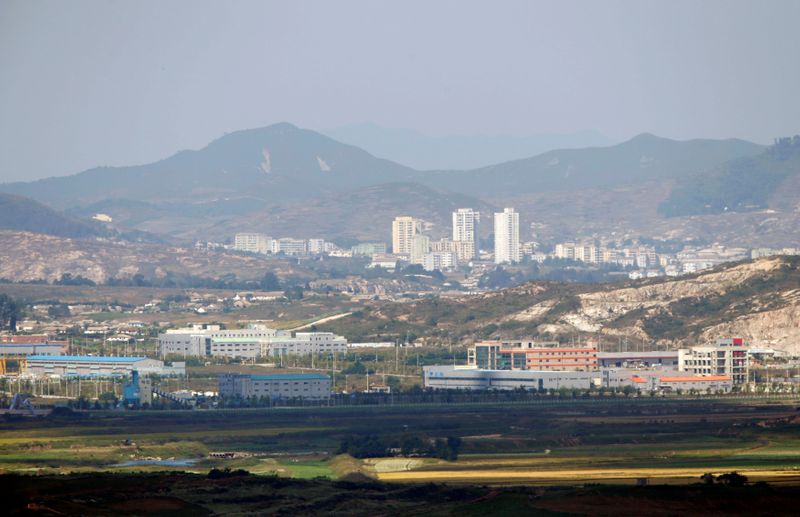By Hyonhee Shin, Sangmi Cha and Josh Smith
SEOUL (Reuters) - Last week, a 24-year-old defector returned to North Korea the way he left in 2017, authorities say, but with a coronavirus pandemic raging in the background this time, his illicit trip drew far more attention.
South Korea has identified the man only by his surname, Kim, and said he was the "runaway" who North Korea accuses of illegally crossing their shared border last week with symptoms of COVID-19.
Facing a sexual assault investigation, Kim evaded high-tech South Korean border control systems by crawling through a drain pipe and swimming across the Han River to the North on July 19, the South Korean military has said. He appears to have spent several days there before being caught.
South Korean military chief Park Han-ki told parliament on Tuesday that Kim, who is 163 cm (5.35 ft) tall and weighs 54 kg (119 lb), cut his way through barbed wire fences installed at the end of the pipe leading to the river.
A Seoul official told Reuters that Kim is believed to have taken a similar path when he defected to the South in 2017, and authorities say he scoped out the area earlier in July, apparently in preparation.
Kim's story as a defector begins and, so far, ends in the city of Kaesong, a North Korean border town that hosted a now-shuttered inter-Korean factory park and liaison office.
When that industrial project was shut down amid rising tensions over North Korea's nuclear weapons programme in 2016, the economic shock prompted Kim to try his luck in the South in 2017, he said in a YouTube video filmed with a fellow defector in South Korea in June.
Rather than make his way through China, as the vast majority of North Korean defectors usually do, Kim headed south via the porous sea border toward the heavily guarded Demilitarized Zone that divides the two Koreas.
"After passing through barbed-wire fences, I encountered minefields, which I bypassed and came to a reed field near the Han River where I stayed hidden for about three hours," he said in the video, adding that he was living off mere bread crumbs.
He started swimming, following the lights on the southern bank of the river. When he finally made land, he let out a cry for help, and was found by a unit of South Korean soldiers.
Little is known about how Kim made a living in South Korea, but a source with knowledge of his background told Reuters that he owed 20 million won ($16,800) to at least one fellow defector from Kaesong.
"He had expressed his wish to become a security lecturer for students, like many other defectors do, but it never happened, partly because of the pandemic," the source said on anonymity due to the sensitivity of the issue.
According to police, a female defector in her 20s filed a complaint on June 12, accusing Kim of sexually assaulting her at his home. They interviewed him once on June 21, and he denied the accusations.
The investigation gathered steam when one of Kim's acquaintances reported to police on July 19 that he threatened the woman and planned to flee to the North, a police official said.
A warrant for Kim's arrest was issued two days later, but according to North Korean state media, he had already arrived there.
By July 24, North Korean authorities had found him in Kaesong, and said he displayed COVID-19 symptoms. North Korean leader Kim Jong Un ordered the city be locked down and declared a state of emergency, state media reported on Sunday.
South Korean health officials said there was no sign that Kim was infected with the coronavirus before he left the South, and at least two people who were in close contact with him have tested negative.

